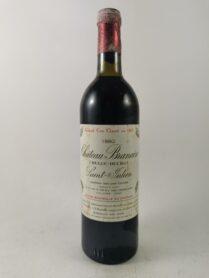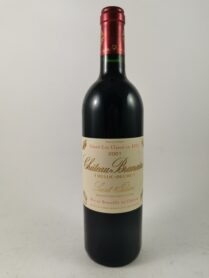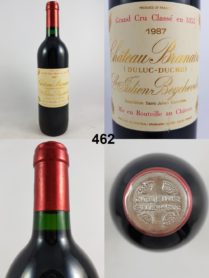Château Branaire-Ducru : Grand Cru Classé of Saint-Julien - Bordeaux Wine
-

Château Branaire-Ducru 1980
€61.20Saint-Julien | Red | 0,75 L
-

Château Branaire-Ducru 2001
€58.80Saint-Julien | Red | 0,75 L
-

Château Branaire-Ducru 1987
€58.80Saint-Julien | Red | 0,75 L
Château Branaire-Ducru is a classified growth since 1855 of Saint Julien. It is the perfect illustration of the finesse of the prestigious Saint-Julien appellation. A complete wine distinguishing itself from the other grand crus of the appellation thanks to its suppleness and velvety texture. A consistent and regular vintage with a synthesis of all the qualities expected of a Médoc wine.
The history of Château Branaire-Ducru and its owners
This vineyard is firmly anchored in the history of viticulture in France. In 1680 it became the property of the Bordeaux notary Jean-Baptiste Braneyre.
The estate of Branaire Ducru is, thereafter, given to the grandson, Laurent de Luc and inherited at the beginning of the XIXth century by his two sons Louis and Justin. It takes the name of Château Braneyre and is classified as the fourth great growth in the official classification of Bordeaux wines of 1855.
Over the years and generations, the estate came under the control of Gustave Ducru and was passed on to several families. Neglected and losing momentum, the farm was bought in 1988 by the Maroteaux family.
Coming from the world of business and finance, Patrick Maroteaux manages the estate with great rigor and is dedicated to its modernization.
The technical facilities were redesigned and reorganized and efforts were made to develop and optimize production quality.
The cellars have been completely renovated and modernized, with the use of pumps and screws to allow vertical flow. These renovations have been added to the new methods of integrated cultivation, which are based on the abolition of the system consisting of the use of insects. It also consists of setting up a fertilizer management system to eliminate them.
Patrick Maroteaux then had several responsibilities in the Bordeaux vineyard. He was president of the Union des grands crus de Bordeaux from 2000 to 2008. His management style and his ability to persuade contributed greatly to the launch of the Grands Crus weekend. He also held the position of president of the Saint-Julien winegrowers’ union.
In 2010, under the impetus of his son, François-Xavier Maroteaux and his sister Sophie Vaillant de Guélis, the vineyard expands by 10 hectares. François-Xavier Maroteaux, subsequently, succeeded his father, in 2017, after a career started in Finance, notably at LVMH.
Surface area of the domain and terroir, location and nearby domains
Located near the Gironde estuary, the estate is part of the Bordeaux vineyard in the commune of Saint-Julien-Beychevelle. A region with exceptional terroirs thanks to its climatic and geological characteristics. The neighboring estates of Branaire-Ducru are also renowned for their great wines, such as Chateau Beychevelle and Chateau Talbot, as well as Léoville Poyferré, Léoville Las Cases, Léoville Barton, Ducru-Beaucaillou, Gruaud Larose, and Lagrange.
The particularities of the terroir of Château de Branaire Ducru
The terroir is mainly composed of Quaternary gravel and clay. Thanks to the temperate oceanic climate, the combination of these different elements makes it possible to have quality vines with an average age of 35 years, with some varieties being a century old.
The particularities of this exceptional terroir have always dictated the decisions to be taken for the development of the estate. Château Branaire-Ducru is thus committed to the environmental management system of Bordeaux wine. A system based on the international standard ISO 14 001. It is also certified High Environmental Value, level 3 since 2017.
Since 2021, the estate has also obtained the label of farmers committed to a virtuous environmental approach for the protection of bees and pollinators, BeeFriendly 2021.
A CSR approach has also been implemented to integrate environmental and social dimensions into the economic strategy. The objective is to take into account all the impacts of the exploitation of an exceptional terroir.
The grape varieties on the estate
The production of the 60 hectare vineyard is composed of 22% black Merlot, 3% Petit Verdot, 5% black Cabernet Franc and 70% black Cabernet Sauvignon (the most planted grape variety in the world and the most internationalized).
It is a rather late ripening grape variety, requiring a certain amount of sunshine to reach maturity. It constitutes, thus, the great vine of Bordeaux, characteristic of the hot grounds with a good pluviometry.
La production est consacrée à 55% au premier vin, Château Branaire-Ducru, et à 45% au second, Duluc de Branaire. The latter is named after the family that gave it its reputation.
In total, the 60 hectares of the estate allow an annual production of 25,000 cases divided between Château Branaire-Ducru and Duluc de Branaire-Ducru. 25% of this production is destined for the domestic market. Three quarters of the production are thus destined for international markets. Especially since the estate has 3 hectares in the Haut-Médoc appellation (the Haut Médoc of Branaire-Ducru).
The style of the wines, their taste, their aromas, their dress…
Château Branaire-Ducru is a typical and refined wine characterized by its elegance and balance. It is a wine that knows how to age thanks to its constancy and its regularity. A great quality which combines complexity and pronounced expression thanks to the consequent improvements implemented in 1988 by Patrick Maroteaux.
In 1991, the latter launched the construction of a modern vat room by eliminating the pumping of the fruit with parcel-based vinification, made possible by the 28 vats, 10 of which were installed in 2010.
In order to optimize production and preserve the quality of the vintages, a second 100% gravity-fed vat room was subsequently built by his son François-Xavier Maroteaux.
In spite of their homogeneity, the four grape varieties allow to have, each year, a production and vintages with their own personality. Generous vintages with a dense and deep robe. They are colorful, intense, acidic and pleasant in the mouth.
Accents of black pepper, blue fruit, mint, eucalyptus and mocha combine perfectly with notes of wet slate and chocolate.
A gourmand wine with a chewy taste that also distinguishes itself by its interesting price-quality ratio. Even the youngest wines have a remarkable drinkability.
